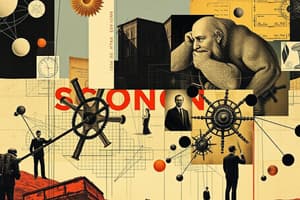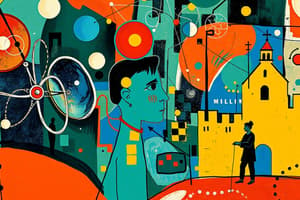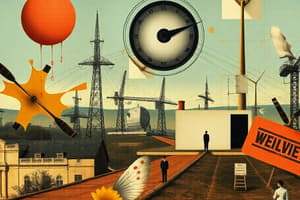Podcast
Questions and Answers
According to philosophers, what is a key aspect of scientific inquiry?
According to philosophers, what is a key aspect of scientific inquiry?
- Accepting all theories as true
- Striving to find disconfirming evidence (correct)
- Finding only confirming evidence for a theory
- Limiting imagination in discoveries
What does Galileo Galilei suggest is the main goal of science?
What does Galileo Galilei suggest is the main goal of science?
- To discover hard truths (correct)
- To understand easy concepts
- To complicate existing knowledge
- To explain unproven theories
How does Aristotle characterize an educated mind?
How does Aristotle characterize an educated mind?
- By accepting thoughts without question
- By memorizing all learned concepts
- By being able to entertain thoughts without acceptance (correct)
- By rejecting all new ideas
What is the view of Rene Descartes on problem-solving?
What is the view of Rene Descartes on problem-solving?
What did Gottfried Wilhelm Leibniz believe about possibilities?
What did Gottfried Wilhelm Leibniz believe about possibilities?
What is the order of knowledge acquisition according to Immanuel Kant?
What is the order of knowledge acquisition according to Immanuel Kant?
What metaphor does Francis Bacon use to describe arts and sciences?
What metaphor does Francis Bacon use to describe arts and sciences?
How does Bertrand Russell describe the relationship between science and imagination?
How does Bertrand Russell describe the relationship between science and imagination?
What is a primary focus of science as defined in the provided content?
What is a primary focus of science as defined in the provided content?
Which of the following best describes technology based on the definitions provided?
Which of the following best describes technology based on the definitions provided?
How does the term 'society' relate to the other concepts of science and technology?
How does the term 'society' relate to the other concepts of science and technology?
According to Michael E. Smith's definition, what is one critical aspect of science?
According to Michael E. Smith's definition, what is one critical aspect of science?
What is the significance of the critical spirit in science as outlined in the content?
What is the significance of the critical spirit in science as outlined in the content?
Which statement best summarizes the interdisciplinary nature of Science, Technology, and Society?
Which statement best summarizes the interdisciplinary nature of Science, Technology, and Society?
What does the term 'tentative findings' in science imply?
What does the term 'tentative findings' in science imply?
What role does reason play within the framework of science as defined?
What role does reason play within the framework of science as defined?
Flashcards are hidden until you start studying
Study Notes
Introduction to STECHSOC - Week 1
- The course explores the relationship between science, technology, and society (STS), its impacts, and various fields of study.
- Students will analyze the historical, social, cultural, ethical, moral, political, and economic aspects of science and technology.
Defining Science
- Science is defined as the systematic study of the structure and behavior of the physical and natural world through observation and experiment. It originates from the Latin word "scientia," meaning "to know."
- Various philosophers offer diverse perspectives on the nature of science:
- Karl Popper: Science aims to find disconfirming evidence, not confirming it.
- Galileo Galilei: All truths are simple once discovered; the challenge is discovery itself.
- Aristotle: An educated mind can consider a thought without accepting it.
- René Descartes: Solved problems become rules for solving future problems.
- Gottfried Wilhelm Leibniz: Everything possible strives to exist.
- Immanuel Kant: Human knowledge originates from intuitions, progresses to concepts, and culminates in ideas.
- Francis Bacon: Arts and sciences should constantly advance.
- Bertrand Russell: Science limits knowledge but not imagination.
- Isaac Newton: Bold guesses are essential for great discoveries.
- Albert Einstein: Great scientists are also artists.
Defining Technology and Society
- Technology originates from the Greek words "tekhne" (art, craft) and "logia" (study), representing the application of scientific knowledge for practical purposes or the manipulation of the human environment.
- Society stems from the Latin word "societas" (companion), representing a group of people living together in an ordered community with shared customs, laws, and organizations.
Michael E. Smith's Definition of Science
- Science is a method for gathering knowledge about the natural and social world, prioritizing reason and observation.
- It's characterized by a critical spirit, constantly testing hypotheses through observation and experimentation. Findings are always considered tentative and open to revision.
- Science is a complex network of evidence and theory, evaluated by scientific communities. STS is interdisciplinary and inherently political.
Course Activities
- A group reflection activity requires students to define "science," "technology," and "society" and present a unified definition to the class.
- A reflection exercise involves analyzing a specific societal issue, examining its personal impact, societal impact, and the science and technology components involved.
Studying That Suits You
Use AI to generate personalized quizzes and flashcards to suit your learning preferences.




